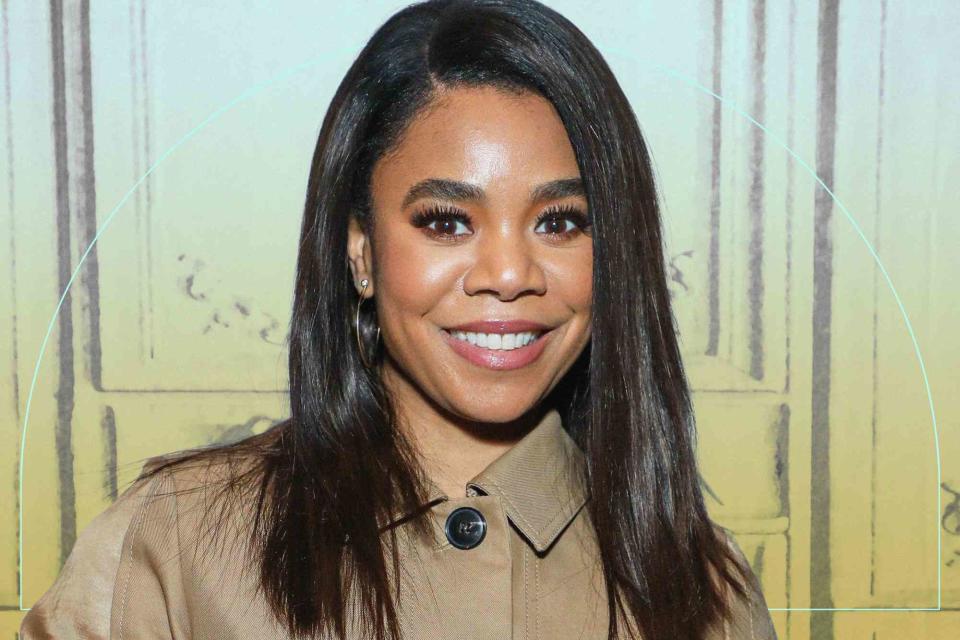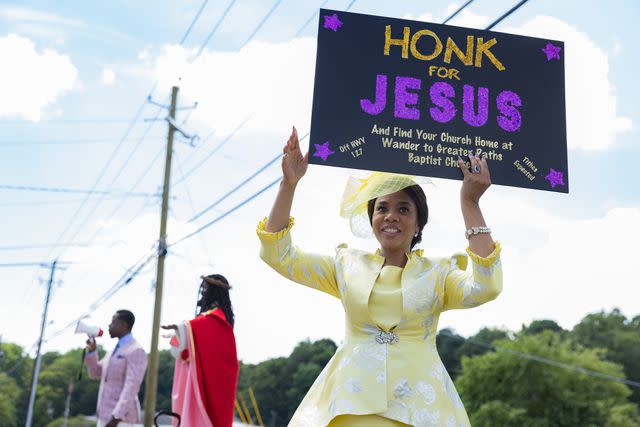Regina Hall Gives New Meaning to "Sunday Best" as a Subversive, Prada-Clad First Lady
- Oops!Something went wrong.Please try again later.
The directors of <em>Honk for Jesus. Save Your Soul.</em> wanted a “Regina Hall type” for their debut film. They ended up with the real thing.

By the time Regina Hall walked into her first fitting for the mockumentary Honk for Jesus. Save Your Soul., costume designer Lorraine Coppin knew what styles she would wear to captivate the sanctuary and the streets, the latter of which Hall's character spends much of her time spreading the good word: Wander to Greater Paths Church was coming back bigger and better. Honk for Jesus. Save Your Soul., a satirical commentary on Black church culture in theaters September 2, stars Hall and Sterling K. Brown as Trinitie and Lee-Curtis Childs, a Prada-or-nada couple whose fall from grace has them strategically plotting their resurgence through the looking glass of reality TV. Along the way, the cameras and boom mics expose the fissures in their marriage, church, and faith — and it's in those cracks where the delectable Regina Hall blooms.
Very much like when the right chemistry between actors makes characters indispensable onscreen, Coppin knew Hall's authentic self would complement the Sunday Best fashions she pulled for a proud first lady of a southern Baptist empire.
"When I saw Regina, she had a presence and [was] very comfortable and free, willing to try on absolutely anything," says the costume designer, who has styled the casts of First Wives Club and Greenleaf. "She already knew who Trinitie was and wanted to explore her being this first lady that just has a presence. [On the day of our fitting] Regina's looking through the racks, and she's like, 'You got her. How did you get her without me being here?' And I said, 'Because I saw you and I know your energy.'"
That's the effect Hall has on people. Last January, during a virtual filmmakers' conversation at the 2022 Sundance Film Festival, where Honk for Jesus. Save Your Soul. made its debut, co-director Adamma Ebo said she and her twin sister, co-director Adanne Ebo, wanted "a Regina Hall type" as the dedicated-but-vilified wife of a closeted, charismatic preacher. The first-time directors' prayers were answered when Hall signed on as their star.
"A lot of folks look to her for comedic chops, which she 1,000% has," says Adamma Ebo. "But she also has really phenomenal, dramatic chops. And quite frankly, everything in between. A Regina Hall type is literally an actor who can do it all. And you don't even feel the switch. You just absorb it."
For two decades, Hall's canon of characters in Black Hollywood films (The Best Man, Think Like a Man, Girls Trip) shored up her as a beloved fave. In the last five years, the versatility in her roles — a vengeful wife in Nine Perfect Strangers, a tenacious trader in Black Monday, and an empathic manager in Support the Girls, which earned her a historic Best Actress award from the New York Film Critics Circle (she was the first Black actress to win) — has turned up the wattage of her star power. And she's happily basking in the brighter spotlight.
"Listen, it's nice for somebody to say they want you or something like you," Hall says with a humble grin when reminded she was the only choice as lead for Honk for Jesus. "I was really happy and grateful to work with them; they're just such incredible young [Black] women."
:Arden Cho Says Tackling Workplace Misogyny Is Like Fighting Crime
The Ebo sisters' first feature gives audiences a chance to witness Hall's portrayal of a woman wrestling with being a dutiful wife, devout Christian, and first lady — knowing the ink isn't quite dry on the undisclosed payout to the young men her husband had sexual relationships with before the church reopens its golden doors on Easter Sunday. (For Lee-Curtis, this insurmountable pressure and the suppression of his sexuality make him combative to the detriment of Trinitie's unyielding support.) Who is she if she's not seated in their red-carpet pulpit?

The film's premise begs the question about Trinitie's choice to Hall: If you were married to Lee-Curtis, would you stay? "Probably not," Hall tells InStyle from the dining room table of her home. "But the circumstances of my life are nothing like Trinitie's. I don't have the weight of what Lee-Curtis is or of what Trinitie has. So no, I don't think I would've been able to, but I also did not have the judgment that she did. I actually felt like if she divorced him, she would also include divorcing the church and her mission and her purpose. So, I understood why she felt like she had to stay."
There's also the attention Trinitie craves, which Hall serves up deliciously, defending her position with sweet Southern microaggressions or full-blown obscenities that would make the devil blush.
"Trinitie likes being a first lady. She likes sitting on that stage in front of that big audience. She loves the way their life looks," Hall says, smiling. "Ironically, her name is Trinitie because it's that trinity — Lee-Curtis and his God and that church — and she feels justified because fundamentally it's a part of her. When her mother said, 'You're blessed, look at all this, and that came from that man.' Sometimes, [with] that belief in prosperity, you get the prosperity alone and not the peace."
:Myha'la Herrold Isn't Afraid of a Little Controversy
Speaking of prosperity, Honk for Jesus. leans heavily into the extravagant lifestyles of mega-church preachers and vibrant fashions of Southern women. Says Coppin, "Atlanta women were my inspiration for Trinitie's looks. They are very stylish, very confident women. It doesn't matter what size they are ... they wear what the fashion is," she says. Trinitie's looks hit two notes: modern and traditional (watch Hall radiate when she finds the perfect hat with silver spider lace for Easter Sunday).
"When she was out raising money or doing something for the church, she wasn't on display. She was there to make the church better, to raise money, to show off her husband, so she was nice, she was corporate because it's all business," says Coppin. "But when Trinitie's on stage, it's like Lee-Curtis said, 'It's showtime.'"
Of course, for the duo, changing outfits mid-sermon wasn't out of the norm for how they showed up (and out) for their congregation. Early in the film, the couple gives a tour of their closet at church, and Hall still giggles at the foolishness of the rainbow of Prada and designer suits that could fit a studio apartment.
"Oh my goodness!" she says, "You don't see their home closet because remember, Trinitie's at church, and she's like, 'That's right because you don't know what's going to happen!' That was the, 'You don't know what's going to happen,' closet."
Exploring the complexities of the church is something Hall knows firsthand. "Growing up, I saw a lot of different ways of religious expression," she says. "My grandmother went to a Baptist church where you had your hat on because you were going to catch a spirit. But my mother went to a very simple Charles Stanley-like church — there wasn't the choir. And then I went to Catholic schools."
Seeing organized religion up close was an added layer to why Hall was the perfect Trinitie. "She was also the one because of the perspective that she brought to it, having grown up, you know, in the church and having navigated her own personal and spiritual journey," says Adanne.
The feeling is mutual. "They're just really creative, and they had a subject that they want people to think about," says Hall on the Ebo twins' motivation for the film, which began as a short seven years ago. "They didn't necessarily do a commentary, but it does raise a lot of questions about the church."
Conversations about organized religion, sexuality, and power are discussions the creatives are ready to spark. "There's so much about it that we love and respect, and that still is very important to us," says Adanne, who, along with her sister, have very deep Southern Baptist roots. "But I think that it could be doing better, and if it doesn't, more and more generations [will start saying] 'I don't need this in my life,' and I think that's because it's not serving them anymore. It's not bringing them joy."
She continues, "We made this film to encourage some sort of progress and definitely to encourage conversation." Now that's something to talk about.

